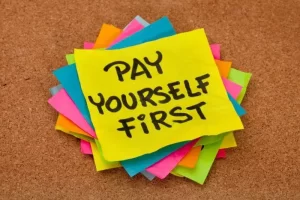What Is Fintech?
Fintech has developed the best investing apps for beginners to invest and grow your money on a small budget.
Fully described as Financial Technology, fintech refers to the innovative use of newly developed technologies to improve, increase, and enhance the use, delivery, and productivity of financial products and services.
Through the utilization of specialized software and algorithms that are used on computers and smartphones, financial technology helps organizations, companies, business owners, and product consumers to manage their financial activities efficiently.
From transferring money to buy things online to using PayPal to make secured transactions, fintech changes the way people access their finances.
What Are Examples Of Fintech?
-
Crowdfunding Platforms
Crowdfunding platforms are sites that allow interaction between fundraisers and app users. On these sites, app users can send or receive money from others in the same place.
Rather than go to a bank to get a loan to finance a project, companies register on crowdfunding platforms like KickStarter, GoFundMe, or Patreon to enable people to invest in their projects.
From peer-peer lending to equity crowdfunding to reward-based crowdfunding to donation-based crowdfunding to profit-sharing crowdfunding, there have been more reasons to set up crowdfunding platforms.
-
Blockchain And Cryptocurrency
Amongst the high-profile examples of fintech in work, blockchain and cryptocurrency remain at the Zenith. Blockchain and Cryptocurrency have helped to facilitate faster, easier, transparent, and more secure transactions.
Cryptocurrency trading platforms like Binance, Coinbase, Cash App, and Gemini connect users on their secured platforms. This enables them to buy and sell digital/cryptocurrencies like Bitcoin, Litecoin, Ethereum, Ripple, etc.
Unlike traditional banks, cryptocurrency trading platforms redefine reliability through the provision of platforms resistible to hackers. More so, blockchain services like Blockverify keep data on the blockchain, thus reducing fraud.
-
Mobile Payments – Mobile Banking Apps
In previous years, people have to go to banks to transfer funds. But now, almost everyone with a smartphone uses mobile payment to sort transactions. If you ask any young person to tell you their go-to payment strategy, they will most likely refer to mobile payments.
With advancements in the fintech industry, people now engage in digital transactions using mobile payments like Paypal, Apple Pay, Venmo, and Google wallets. Even so, banks have made things easier by developing mobile applications for their users to use.
-
Insurance
Also known as Insurtech – Fintech has revolutionized the insurance industry by reducing the cost of services, improving risk assessment, improving efficiency, and enhancing customers’ experience/satisfaction.
According to CNBC, insurtech start-ups like Oscar health are now increasingly attracting funding.
-
Robo Advising And Stock Trading Apps:
Robo-advisor is a digital platform-based financial advisor that collects and compiles information relating to the financial status and future financial goals of a client in a bid to offer financial advice and set up financial plans without human interaction.
Robo-advisors provide financial plans, easy account setup, account services, portfolio management, and secured options.
Robo-advising fintech apps like Ellevest and betterment have changed the asset-management sector by providing algorithm-based management, thus lowering costs and increasing efficiency.
More so, the development of stock trading apps like Acorns and Robinhood has made it possible for people to buy and sell stocks on their mobile devices.
-
Budgeting Apps
Previously, consumers are left with no other choice than to solely gather checks, create their own budget, control excel spreadsheets to track their finances.
But the introduction of budgeting apps now makes it easier for consumers to keep track of their income and expenses easily. Much more, popular budgeting apps like INTU help users track their monthly income and expenditures on their mobile devices.
Who Uses Fintech?
Everyone uses Fintech. Companies, business owners, and product users (consumers) use fintech to manage and oversee their financial activities.
Why Is There A Steady Growth In The Use Of Fintech Applications?
Global fintech adoption has reached 64%, and global consumer awareness of fintech mobile payment services has reached 96%. Here is why the growth is steady.
- DIY Investing Apps: Fintech removes the pains of spending hours on the phone with a financial advisor by providing trading apps that allow you to receive a personal portfolio, check performance, trade stock and shift funds without the need for human interaction.
- Ease of Use: A number of people find finances quite confusing and challenging. But fintech app designers have made things easy by providing simple, clear, easy-to-use applications for consumers.
Uncluttered dashboard, clear interfaces, unambiguous segmentation, and neat integration of functional elements make it easy for first-time app users to use.
- Lack of stress: Fintech apps remove the stress of visiting a brick and mortar bank branch to begin to invest.
- Use of mobile phones: With a smartphone, and an internet connection, you can invest, transfer funds and track your expenses in the comfort of your home.
- Access to information: With fintech apps, consumers can trade stocks, save, and get financial advice that will enable them to generate profit in the stock market
- Little or no fees: Trading apps like Robinhood and Acorns offer a number of services for free or at a low cost.
How And Why Is Fintech Reshaping The Future?
How?
Fintech is reshaping the future by introducing a customer-centered approach to the financial industry.
This customer-centred approach provides solutions that can meet the needs of consumers in terms of convenience, personalization, usability, and accessibility.
Amongst others, Fintech provides various fintech apps, multiple messaging channels to improve customers’ experience, introduces blockchain technology to offer a quicker and easier way of completing transactions while building wealth, and incorporates Robo-advisors to make investing easier.
Why?
Fintech is reshaping the future to make financial operations cheaper, optimize operational efficiency, provide more secure activities, create fast economic growth, improve traditional financial services, empower small businesses and make data more meaningful to companies.
5 Things To Know About Fintech
- Faster and Cheaper Remittance Transfer: Cross-border bank transfer is costly. Blockchain changes the narrative by making transactions faster, easier and more transparent
- Banks may stop existing: In a few years, fintech start-ups may finally replace traditional banking. Peer-to-Peer lending companies took over China in 2015 until regulators stepped in.
- Unbanked may no longer exist: Fintech will improve financial inclusion by making everyone a mobile money account holder without necessarily passing through a bank.
- Smartphones may soon become financial advisors: Having Fintech app on phones give consumers easy access to on-demand financial advice.
- Multiple Choices on management and investment: Fintech apps also help users track and manage their funds, notify them to pay their bills, bring up investment options, and encourage them to save.
Here Is A List Of 8 Best Investing Apps For Beginners To Grow Money Fast. These Apps Are Pretty Compatible With Many Budgeting And Financial Investing Applications.
-
Acorns
Acorns is one of the best investing apps for beginners. It helps users to start saving by rounding up their transactions to a dollar and then depositing the difference into an account. When the deposits reach $5, Acorn invests it in a portfolio.
Account Minimum – $0
Monthly Fees: This trading app is free for college students. Between $1 and $3 for non-college students
Pros
- The trading app charges no trading fees
- Users do not have to pay so much attention before investing
- It rebalances users’ portfolio automatically
Cons
- Users on the fintech apps cannot make large investments with spare change
- Limited account options
Account Types
- Taxable non-registered account
- Registered Retirement savings account
- Checking account with a debit card
Getting Started
- Log in to acorns.com to open an account on the trading app
- Take a quiz to determine your investing goal and the risk associated
- Review your portfolio and invest or wait till the app starts investing for you when your transaction rate equals $5
Users can deposit funds through a one-time lump sum investment, recurring investment, and round-ups on the trading app.
-
Betterment
Betterment is best for long term investors. It is a Robo-advisor app that invests based on the goals of the account holder.
This platform uses the user’s age, income, and proposed age of retirement to determine their risk level. It automatically manages the user’s portfolio.
Account minimum – $0
Fees: Digital plan users are charged 0.25%. Premium plan users are charged 0.40% annually.
- No transaction fees.
- No minimum balance.
- Deposit is automatic.
- ‘Retire Guard’ feature calculates the amount a user should save.
Cons:
- Users cannot choose individual stocks.
Account Types
- Taxable non-registered investment accounts
- Smart saver accounts.
- Registered Retirement Savings Account – IRAs
Incorporation of Robo-advisors makes betterment the right choice for newbies.
Getting Started
- Download Betterment app and register
- Complete a survey to determine your portfolio
- Choose an amount to deposit – First time and recurring basis
-
Stash
Cost effective investing app: Like Acorns, the app rounds up transactions and deposits the difference, which is later invested in individual stocks. Stash doesn’t use Robo-advisors.
Amount minimum: $0
Fees: From $1 to $9 depending on the subscription plan
Users can choose individual stocks and ETFs
Pros
- Availability of round-up option
- Users can invest with as little as $1
- Investors can pick individual stock
Cons
- No Robo-advisor to auto-invest or manage funds
- Users can quickly outgrow the app as it is too basic
Account Types
- Taxable non-registered investment account.
- Custodial account – A brokerage account for children. It has great investing and tax benefits.
- Registered retirement savings account IRAs.
Stash is one of the best investing apps for beginners looking to invest independently and those who want guidance in selecting investments. Stash offers a number of ETFs and individual stock. Stash has an auto-stash feature that allows users to save and invest automatically
Getting started – Stash account doesn’t take time to open
- Download the trading app to register
- Link and verify your bank account
- Make an initial deposit and begin to invest.
-
M1 Finance.
M1 finance Robo-investing app gives users more choice in their investment. It is best for those who need several investment options. Users can set up an automatic investment plan.
Account minimum: $100
Monthly fees: 0%
Pros
- No monthly or annual trading fee
- Transparency
- Users can see their current position on the dashboard
- Investors can choose both ETF and individual stocks
- Users can set up automatic withdrawals
Cons
- $100 minimum deposit to get started
- Financial advisors are unavailable
- High cost for premium service
Getting Started
- Register on the trading app
- Take a quiz to determine your investment goals and risk levels
- Edit the portfolio to taste
- Get your account running almost immediately
-
Ally
As one of the best investing apps for beginners, Ally serves as an excellent choice for DIY investors. Best for active traders interested in huge discounts
Account minimum: $0
Monthly Fees: Low fees
Pros – Managed Account
- Best for those who do have time to self-manage
- Robo-advisor automatically self invests based on stated goals
Cons – Managed Account
- Account minimum of $100 is required
Pros – Self-Directed
- You can manage your own investment portfolio
- No account minimum
- No annual fee
- No inactivity fee
- No maintenance fee
Cons – Self-Directed
- The investor has to be careful with investment on the trading app
Account Types
- Self-directed – Joint, custodial, individual taxable, Coverdell, IRAs.
- Managed – Individual and joint taxable, custodial, and IRAs.
Ally is best for casual traders, beginners, advanced traders, and active traders.
On the fintech app, Ally investment offerings include: Mutual Funds, Stocks, ETFs, Options, Fixed Income Securities, Penny Stocks
In Ally, portfolios are rebalanced as required in response to market fluctuations.
-
FundRise
FundRise is an excellent alternative fintech app. It offers real estate investing, and real investment trust (REITs)
Account minimum – $500
Annual Fees – $1 other fees may apply
Pros
- Open to every investor
- IRA accounts are also available
- Website is easy to use
- Instant diversification
Cons
- Some investments may require due diligence
- Investment is highly illiquid
- Specific income requirement for buying shares
Account Types
- Taxable non-registered investment account
- Registered Retirement savings accounts – IRAs minimum
-
Robinhood
Robinhood is one of the best investing apps for beginners who want to engage in commission-free options, stock, ETF and cryptocurrency trading
Account minimum: $0
Monthly fees:
Pros
- Streamlined interface
- $0 account minimum
- Cryptocurrency trading
Cons
- Customer support is limited
- No bonds
- No retirement account
-
Stockpile
This trading app is best for buying fractional shares of any company. Stockpile can be used to buy ETFs, single stocks, or give an e-gift card that is redeemable for stock. Stockpile is one of the best investing apps for beginners.
Account minimum – $0
Fees – $0
Pros
- Low Trading fees
- No annual fees
- No minimum balance
- Fractional shares are allowed
Cons
- Limited Account selection
- Minimal analysis tool
- Limited availability of securities – No options or bonds
Account Types
- Taxable non-registered investment accounts
- Custodial accounts
Conclusion
Amongst others, the advancement of Fintech is seen in the progress of these investing apps. While there are several other investing apps, the ones listed above have proven to be very useful for investors despite their differences. It’s one of the best trading apps out there for free.
Here are the best investing apps for beginners, it’s pretty easy than ever to get started with ETFs, stock and mutual funds investing in this day and age.
To invest, choose an investing app that is in sync with your investing needs.
Related
- How to Create and Launch a Profitable Digital Product to Sell Online Fast
- 11 Best Digital Products that are Super Easy to Sell
- Gig Economy Side Hustles: 18+Best Work from Home Jobs to Make Extra Income
- 20 Best Small Business Ideas to Start Under $100 – Low-Cost Start-Up Gigs
- 26 + Profitable Home Based Business Ideas For Moms to Make Money
- Home Based Business: Top 10 Reasons Why Starting a Business from Home has Many Benefits
- The 22 Best Books Every Aspiring Entrepreneur Should Read
Let me know if you’ve used or are using the half payment method for any of your bills? how is that going and how do you like it.































19 thoughts on “8 Best Investing Apps For Beginners To Grow Your Money On A Small Budget”
Thanks for another informative site. Where else could I get that type of information written in such a perfect method? I’ve a challenge that I am simply now working on, and I have been on the look out for such information.
Thank you for stopping by as well as had pleasure reading the post-Rose
This is a topic that is close to my heart… Take care! Exactly where are your contact details though?
Here is my email admin@investadisor.com
Pingback: What Is a Robo Advisor: Features and Advantages To Investors - Investadisor
Pingback: Index Funds vs Mutual Funds: What’s the investment that best suits you? - Investadisor
sildenafil citrate pills https://www.pharmaceptica.com/
I have learn several good stuff here. Definitely value bookmarking for revisiting. I wonder how much effort you put to make the sort of magnificent informative site.
It takes plenty of time. Thanks
I agree with you that what we say is a reflection of ourselves that’s why I always try to share something I know about a topic whenever I leave a comment. In doing this, there’s a better chance that my comment will not be ignored and will be posted. I’m sure we’ll be meeting the same bloggers and it helps to be seen as someone reliable or insightful. Besides, I’ve already taken the time to read the post so why not take the time to contribute something as well. It’s a nice feeling when you do that. 🙂 Thanks for the tips!
Cheers
Thank you for the list. It is a interesting starting point on looking for high PR, high clout comment luv blogs since I am looking to make a real top 10 list of them, but they do look like they are getting used far more then the plugin being all that useful for them. And that kind of locks them into their visitors, when they are showing up to try to get a dofollow link off them instead of really there to read them. Congratulations on the very low Alexa global rank this site has also, and the 97 percent search engine traffic rating.
Much appreciate.
Loved how you have curated the overall blog. Thanks for sharing this
Pingback: The Practical Guide to Purchasing Your First Investment Property - Investadisor
Pingback: How to Create and Launch a Profitable Digital Product to Sell Online Fast - Investadisor
Pingback: How To Buy A Car At The Auction (Best Tips to help You Avoid Buying a Total Lemon) - Investadisor
This is a brilliant list of investing apps! Just a quick note to tell you that I have a passion for the topic “Investing and investment” at hand. I am going to share the post on my social media pages to see my friends and followers. Thanks and keep up the good work!
Thank you, come back for more posts